ZINE MUNCH #9: Twitter Mutual Writer House and the Limits of Critique (w/ Jessica Dai and Emily Liu)
On Kernel Magazine, agency, and moving beyond tech boosterism or tech fatalism
Emily Liu and Jessica Dai are (respectively) the editor-in-chief and managing editor of Kernel Magazine, an annual print publication by Reboot, a community reimagining techno-optimism for a better collective future. They just released their second issue, which you can purchase in print or online. I’ve always been drawn to Reboot for its emphasis on ‘writing as politics’ and instilling a sense of agency in its readership.
I’m cheating a little bit with this ZINE MUNCH—I’ve been involved with Reboot for a few years, first as a participant in our student fellowship and now as an organizer, in addition to editing two pieces in Kernel’s first issue (Jasmine Sun’s "take back the future!” and Chris Painter’s “Unstoppable Mechanisms”), and contributing a piece, "Prison Phones and the Problem with Profits” for issue 2.
I was lucky enough to be in San Francisco for our in-person launch at The Commons earlier this month, but have been in New York for the past few weeks so we talked over Zoom last Saturday. All of the pieces for the issue unlocked online today, so you should definitely go and read them!

Lucas Gelfond: Can you tell the ‘Kernel origin story,’ or, I guess, how did you both get involved?
Emily Liu: In 2021, Jasmine Sun and Jasmine Wang organized a group house / writing retreat; [the plan was] we’d all live together for a month, doing our jobs or schoolwork in the day, and do workshops or write together in the evenings and on weekends. There were 11 of us, and many of us didn’t know the other people in the house except through Twitter or friends of friends. Jasmine Sun and I were Twitter mutuals, she messaged me on Twitter and was like ‘hey, I’m organizing this, would you be down to join?’ and I was like, ‘yeah, let’s do it.’ After the retreat ended, a group of four of us — Jasmine Wang, Saffron Huang, Jessica Zhou, and myself — continued to work on this project to turn it into a print magazine.
Jessica Dai: My version of the Reboot origin story is that, right before the pandemic, there were several books about technology that were coming out where the authors were supposed to do book tours that Jasmine [Sun, director of Reboot] and I were both excited about, because we’d both get to see them even though we lived in different cities. I think the specific books were Wendy Liu’s “Abolish Silicon Valley,” Anna Wiener’s “Uncanny Valley,” and Jenny Odell’s “How To Do Nothing.” Obviously these tours got canceled and we were really sad, so we were like ‘what if we just emailed these authors and asked them to do a book event, just for us and our friends, and sent them a Zoom link—would they reply?’
Their answer was yes, and we just started to put it out publicly on Twitter and noticed some of our Twitter mutuals, like Emily, would repeatedly show up to these public events. Because we saw a cohesive group that was forming and there were always more people who wanted to come, we realized, ‘maybe there’s something here.’ Partially it was COVID and people were stuck at home, but we thought there really was this desire in general for a space or community outside of work or school to talk about more structural issues in “tech and society.”
There were many phases of Reboot, first just events, then the newsletter, then we did a fellowship for undergrads for the first time, and the end of the fellowship coincided really nicely with when the writer house started.
LG: How did the magazine emerge from the writer house? What was most surprising about the process?
EL: It was a continuous process of Googling things, trying something and crossing your fingers that it works. Some of us had made zines before or written for various publications, but none of us had made a print publication ourselves of this scale. We had no idea what the overall timeline was supposed to look like because we didn’t know how long things would take. What printer do we use? What design software do we use? We didn’t know any of this. Through a lot of teamwork, research, and trial and error, we were able to print the inaugural issue of the magazine. But I also think it was very much made possible because we had friends at Logic Magazine and friends at other places that would always answer our questions and give us advice for how to get this thing up and running.
LG: Reboot had an online presence before the magazine; What was the thought behind the print publication?
JD: The first reason is that it’s cool, and then all of the other substantive reasons are sort of counterfactual backfilled reasons for why it’s interesting: Print has more longevity, it’s more serious, you have more time and space to think about things, I think these are all true, but [the motivator] was definitely—it’s cool to have a physical object!
LG: What do you consider peer publications, or, I guess, what do you consider publications that have influenced Kernel’s approach?
EL: I feel like Logic is the closest match by far. The places that we all respect or respected (some of them have now shuttered) are probably Real Life, WIRED, and Input in terms of [general] publications on tech.
JD: We also really like Noema, Aeon, and The Drift. They aren’t explicitly about technology but the sort of work they produce is adjacent in some way to what we’re interested in, in terms of having space for longform analysis that’s not solely criticism. Some of the places I listed tend toward more criticism than we [have], but it’s some combination of academic theory that’s very ‘applied’ in these magazines.
LG: Are there limits to the structural critique of things? What are the sort of things you want to make people aware of, in terms of articulating options?
EL: Sharp critique is useful — but I think positing an alternate vision is a necessary complement to that. I think media that only reacts and never articulates a path forward can leave people feeling stuck. Maybe those options look like joining a union or unionizing your workplace, writing and thinking in public, meeting like-minded folks and finding community around your values and priorities. I think those kinds of alliances are much stronger than a connection based solely on mutual distaste.
JD: Or, organize locally; your contribution to the world doesn’t need to be ‘writing code that solves poverty’ or whatever. (Which is also great!)
LG: What else does Kernel want to articulate that is not criticism? Or why is this a priority?
JD: The most basic, not intellectual answer to this is: I like reading criticism, but after the end I’m like ‘what am I supposed to do with this information?’ I think criticism can be useful to provide a new lens on a specific topic, but I always ask myself ‘what does this new lens provide me that I did not have before?’ Maybe people who are really into criticism will get mad at me, but I think most of it doesn’t go beyond that.
This is not to say that Kernel’s pieces are necessarily actionable, but aspirationally, the type of work we want to have in Kernel is criticism not just for the sake of an intellectual game, it’s criticism towards the end of reformulating your orientation toward something substantive: ‘if this is true, then how does this implicate how do I go about my life or make certain decisions?’
JD: I think speaking for Reboot as a whole, we would characterize ourselves as political for sure, but we are pretty big tent in terms of the things we publish or people’s ideologies within our community. I don’t think we have Trump supporters, for example, but people [certainly] have different theories of change or different takes on what systems might be best for the world. We think that is good! Disagreement is good because it creates a process for coming to a more rigorous articulation of what we think is true, and I think that’s what Reboot in general is hoping to do.
As much as ‘consciousness raising’ has been critiqued for not leading to action, I think awareness [among tech workers] is really important because, as Emily said, they aren’t reading those publications or don’t necessarily have ‘critique brain,’ but that doesn’t mean that they don’t care about the world or can’t form their own opinions about what the future should like. It’s just that they haven’t either been forced to or had the opportunity to. This isn’t measurable, but our hope or goal is that people read our stuff and think critically about themselves, their own lives, and the role they want to play in the world.
Maybe that means people take action in certain directions. Maybe they quit their job. Maybe they don’t quit their job, but if they’re approached by an organizer, they have better context for how to think about that interaction within a system as opposed to being like, ‘why is someone asking me to do another meeting?’ Obviously the arrow between ideology and action is very ‘question mark’ but I think that’s the hope.
EL: It’s not like we have KPIs [editor’s note: key performance indices] [speaker’s note on final pass through transcript: term used ironically] for Kernel or something, so it’s hard to quantify when we do succeed. That said, when we hosted launch parties in San Francisco and New York this year, we were all kind of floored by how many people attended both of them. We’d never hosted a real life event of that scale before and we pretty much sold out both, for SF we had almost 170 people come, for New York we had 90 or so people come.
JD: The alternate version of the Reboot origin story is that Jasmine [Sun] and I have been really close friends for a long time. All throughout college, I was studying computer science, and Jasmine was studying sociology, but at Stanford, so very much immersed in tech. We’d be constantly texting each other like ‘oh my god, what is this industry like?’ or ‘all of these horrible horrible things happen and everyone still wants to participate, why is nobody doing anything about it?’ Obviously, they were all very level zero or level 0.5 thoughts 19 year olds, but Jasmine and I, basically the whole time, were talking, exchanging readings and books and talking about them while we were in the middle of figuring out our mid-undergrad career crises. I feel very lucky because I think not everyone just happens to have a really good friend that will have these conversations with them, and this was ultimately super formative. People want to talk about these things, but it’s not easy to just bring that up organically with your friends, and that’s part of why we care so much about nurturing a community beyond just publishing written artifacts.
LG: It’s almost one step behind relational organizing or something […] How do you think doing technical work has shaped how you think about the magazine’s editorial direction, and vice versa? [editor’s note: Emily is a software engineer at the Washington Post, and Jessica is a computer science PhD student at the University of California, Berkeley, after spending two years at Arthur, a startup working on observability and reliability for machine learning.]
EL: I think working in tech gives our team more credibility to a mainstream tech audience. It feels like within tech, and maybe this is a flaw within the industry, people give more credibility to people who have technical knowledge or can demonstrate fluency in industry-specific topics..
[…] That said, we don’t just want to be a magazine where all of our authors work as software engineers or something. When we say we’re a magazine by and for tech workers, we also mean people who use or are affected by tech, not necessarily just the “builders.”
JD: There’s a ton of people who think ‘oh my god, the tech industry is so bad,’ but if you look at the undergrad level, so many kids are working so hard to get into a CS major, or to get a CS internship. As an external observer the culture of careerism might seem distasteful, but I don’t think we should write “tech people” off as fundamentally or irredeemably anti-political. One, I just don’t think they are, a priori, but then also, if you want to have structural analysis of this, everyone is so pressed about going into tech because they have five or six digit student loans [or similar]. I guess this is the case for empathizing with—especially the youngest cohort of—people in tech. For new grads and students, there’s a very specific reason why tech culture is the way it is, and it’s important to recognize that. To bring it back to Reboot and Kernel, we want to catch them at this intervention stage.
EL: Kernel exists because we saw two pre-existing buckets of tech thought, neither of which really resonated us, one on the left being super fatalistic, like, ‘the world is fucked, there’s nothing we can do about it’ kind of mentality, and the other side which is the hyper-optimistic, venture-backed ‘solutionism.’ We want to present a type of writing that thinks about all the ways tech has hurt people in the past, but also charts a path forward. Our theme for Issue 2 is “how do we get there?” and the issue revolves around the question of “what are the people, tools, and ideas that can bring us to a better future.”
[…] For many other publications, I think their audience leans literary, like, people who read the Drift are likely to also be reading the New Yorker and other publications in that vein. For Kernel, we’re specifically trying to get an audience of people who build tech or are affected by tech or consider themselves tech-adjacent in some way.
[Our thought] is very much about equipping technologists themselves to think more critically about the things that they’re making or the industry that they’re shaping. So much tech critique comes from the outside. What if it was people who were actually capable of making the change themselves within the tech industry reading the content? Ideally, Kernel can instill a sense of agency in its readers.
Reboot’s been a wonderful community for me—if you’re an undergrad (or know any undergrads!) interested in similar questions of tech, humanity, and power, keep an eye out for the next iteration of our student fellowship! You can also subscribe to get Reboot regularly in your inbox:
until the next!
~ lucas









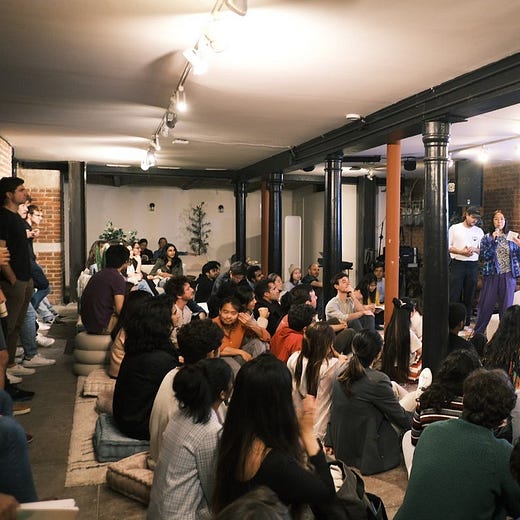
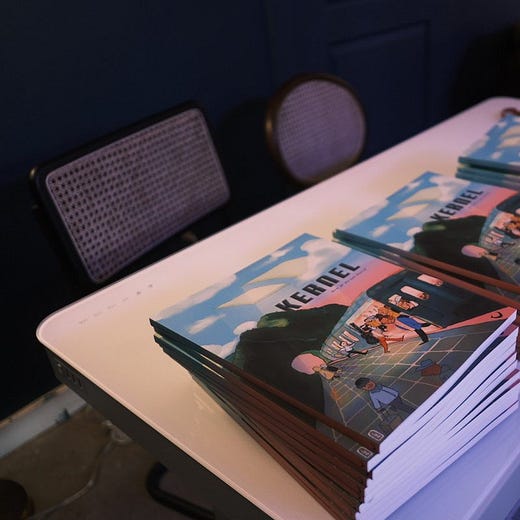
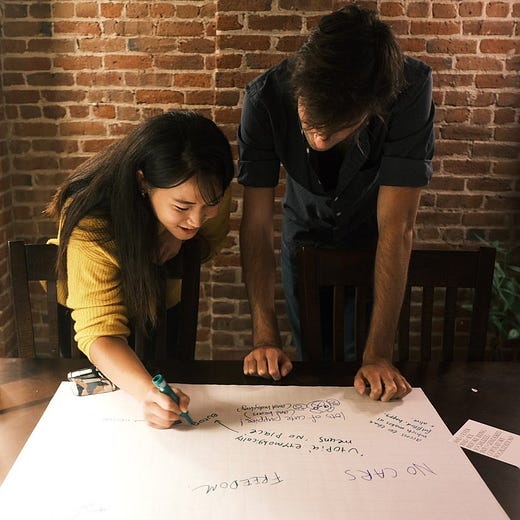
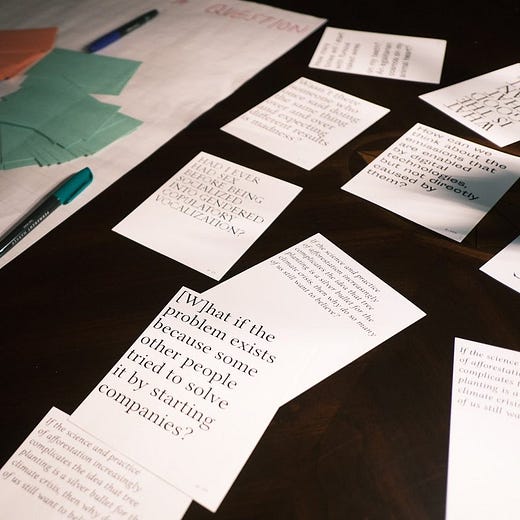
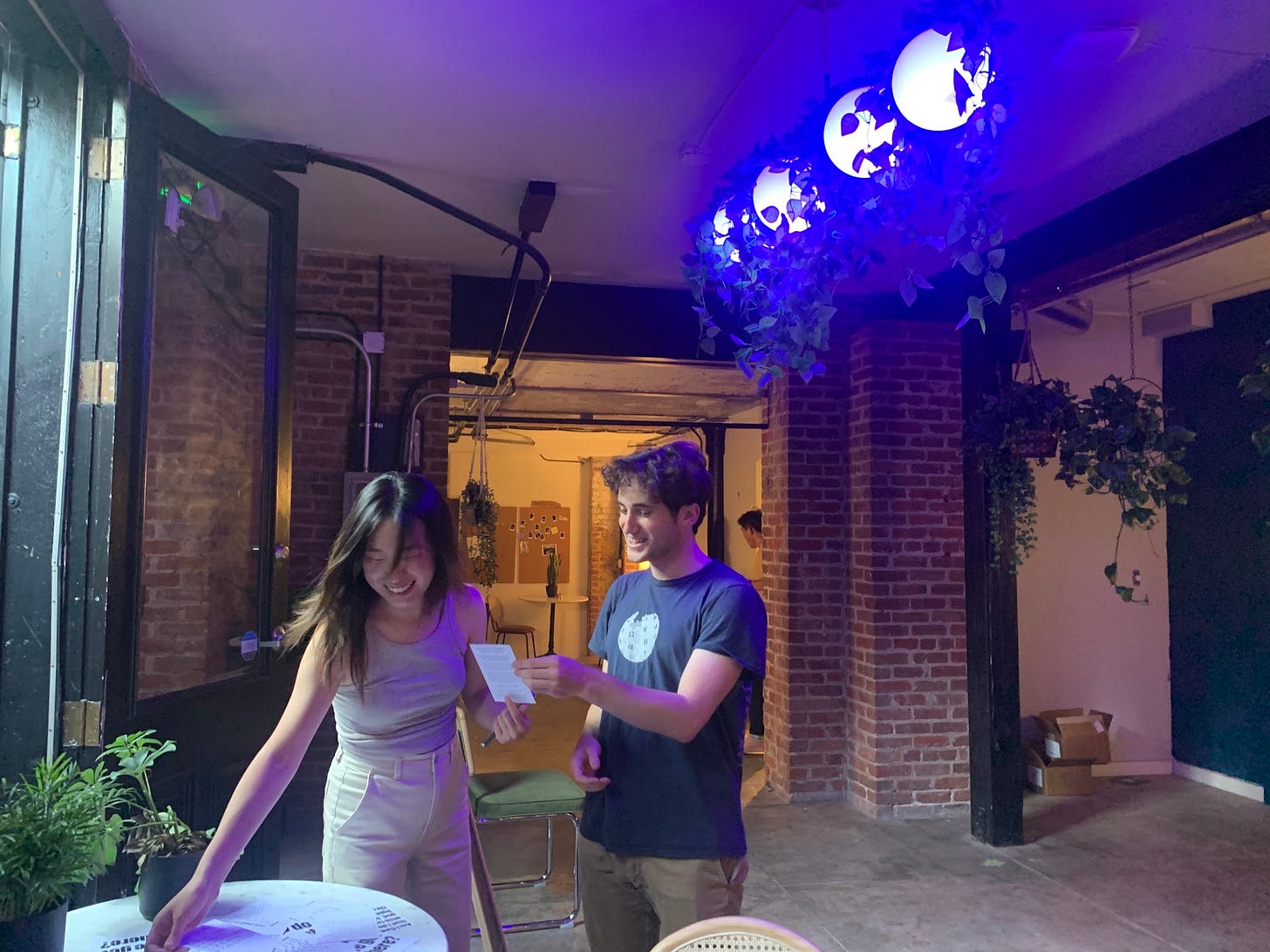


Fascinating. Sounds great -- just ordered issues one and two in print form.
banger